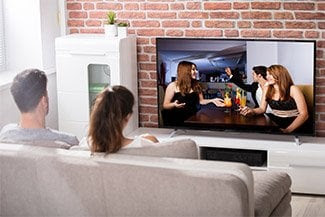Are laugh tracks really effective?
 Why did the smartphone need glasses? Because it lost all of its contacts! [laughter…?]. This is one of 40 jokes of its kind used in a study on the effectiveness of canned laughter. You may not have found the joke made earlier very funny, but you might have laughed at it anyway had it been followed by recorded laughter. Read on for the results of this more-serious-than-it-seems research on humor sensitivity, particularly in autistics.
Why did the smartphone need glasses? Because it lost all of its contacts! [laughter…?]. This is one of 40 jokes of its kind used in a study on the effectiveness of canned laughter. You may not have found the joke made earlier very funny, but you might have laughed at it anyway had it been followed by recorded laughter. Read on for the results of this more-serious-than-it-seems research on humor sensitivity, particularly in autistics.As the study’s authors point out, recorded laughter (live or pre-recorded) was introduced to remind listeners and viewers that they were watching humorous programming and to make them feel like they were part of the audience. Are you perhaps one of the many people who can’t stand recorded laughter on TV shows and series? Does this insistence on getting you to laugh drive you crazy? Sophie Scott and her colleagues at the Institute of Cognitive Neurosciences at University College London hypothesized that the presence and nature of laughter could implicitly influence the perceived humor of a joke. If this were the case, adding laughter could modulate the funniness score given to jokes.
To test their hypothesis, the researchers voluntarily drew from what they call “dad jokes:” average or not-so-funny jokes that would prevent any capping effects. For example, why are cats good at video games? Because they have nine lives! [laughter…?].
First, to establish funniness averages, the scientists asked a group of 20 people to evaluate the 40 “dad jokes” recorded for the experiment by a professional comedian. Participants gave each joke a score between 1 (not funny) and 7 (hilarious). Next, the scientists enlisted the participation of two other groups: a neurotypical group (48 subjects, average age: 32.9 years; 24 women) and an autistic group (24 subjects, average age: 34.9 years; 26 women). Two versions of the recorded jokes were created: one with canned laughter and the other with spontaneous (real) laughter. Two series of jokes with artificial vs spontaneous laughter were created so that participants only evaluated each joke once.
The results indicate that adding laughter increased the jokes’ perceived funniness. In neurotypical adults, there was a significant difference between the initial joke scores and the scores for jokes with recorded laughter (regardless of the type). The increase in perceived humor was however modulated by the nature of the added laughter; the spontaneous laughter led both groups to judge a joke to be funnier than if it was followed by canned laughter. This suggests that all subjects implicitly processed the laughter: not just its presence, but also its type.
The only difference between the two groups was that the autistic group gave higher scores to the jokes with added laughter than neurotypical participants. According to the authors, this could be explained by the fact that neurotypical individuals may be more conscious of the fact that “dad jokes” are considered childish and old-fashioned, while autistic individuals may be more open to this kind of humor. Professor Scott and her colleagues added that: “Our data suggest that laughter may also influence how funny the comedy is perceived to be, and that people with autism are equally sensitive to this effect.” The researchers hope to soon explore how laughter influences joke perception in the brain.
Here’s one last joke to conclude this article: Who is the best Kung Fu vegetable? Brocc-Lee. Still not laughing? Go take a look at the other 37 (not very) funny jokes…
Source: Qing Cai, Sinead Chen, Sarah J. White, Sophie K. Scott, “Modulation of humor ratings of bad jokes by other people’s laughter”, in Current Biology, July 2019 // University College London website: Canned laughter works, finds UCL-led study of ‘dad jokes - https://www.ucl.ac.uk/news/2019/jul/canned-laughter-works-finds-ucl-led-study-dad-jokes







